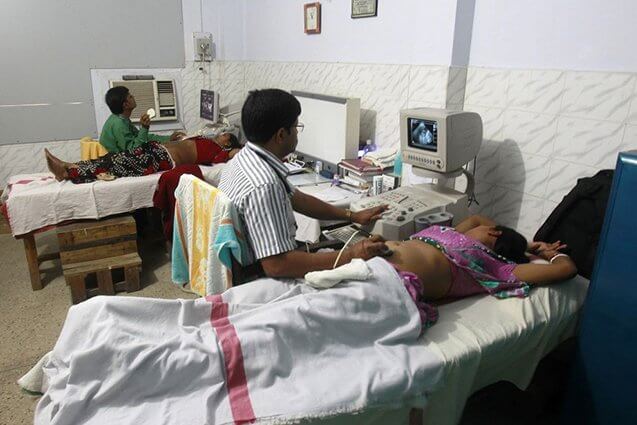The Indian Medical Association’s call to ban ultrasound services and exclude doctors of other specialties from the ambit of the law on pre-natal diagnostic techniques will weaken the steps being taken to arrest the declining child sex ratio.
On June 6, the Indian Medical Association (IMA) organised a massive protest in Delhi under the banner ‘Dilli Chalo’ to protest against a series of issues affecting the country’s medical professionals. So while one is in consonance with their demand to look into issues of rising violence against doctors, what is disappointing is the clamour from the fraternity to weaken the Pre-Conception and Pre-Natal Diagnostic Techniques (PCPNDT) Act, 1994. The Act penalises those involved in the process of sex-determination and selective elimination of fetuses.
The Act was enacted in the 1990s to address the declining sex ratio. As a legislation, however, this is one of the poorly implemented laws of the nation. Census 2011 data, showing a decline in child sex ratio from 927 in 2001 to 919 in 2011, was a wake-up call to the state. A likely cause for this decline is a combination of various factors – availability of technology (in the form of ultrasonic machines), support of doctors and increased mobility in spreading the message that prenatal sex determination is possible.
The market principle of demand and supply has been operating in the country and on an average six lakh girls from the country are annually being eliminated through sex determination and selection. The prime minister took note of this and stepped in by appealing to the nation ‘Beti Bachao, Beti Padhao’. The scheme was launched in the gender critical district of Panipat in Haryana and spread across states. A number of steps since then have been taken by the government and civil society organisations to help arrest the decline in the sex ratio.
A close watch from the prime minister’s office led to stricter implementation of the PCPNDT Act in several states, resulting in raids on unregistered ultrasound clinics, nabbing of quacks and booking of doctors found involved in and flourishing through this practice. This possibly disturbed the ecosystem in which those who wanted to know the sex of the fetus and those who could tell – in this case, the doctors. Troubled by this turn of events and being pushed to follow laws, some doctors in states like Maharashtra reportedly began denying medical termination of pregnancy under the garb of abiding by the PCPNDT Act.
The medical termination of pregnancy is a woman’s right and is protected under the Medical Termination of Pregnancy Act, which does not conflict with the PCPNDT Act.
Nowadays, radiology and diagnostic clinics have become money minting opportunities, and all kinds of specialised doctors/paramedics are using these techniques across the board for sex determination. But the IMA has been advocating only banning ultrasound services and leaving aside doctors of other medical specialties from the ambit of this law. All this clearly brings out the intent to weaken the implementation of the PCPNDT Act.
Our medical lobby should, in fact, draw lessons in morality from South Korean medical professionals who led the campaign against sex determination in their country and helped in reversing the trend there. However, unfortunately, this seems like a far-fetched dream and ‘profit first and ethics last’ seems to be the new norm.
Another demand that the IMA has put forth is the decriminalisation of paper work deficiencies, claiming that record-keeping by doctors or clinics is a ‘clerical job’ and errors like not filling up forms, incomplete forms and missing signatures should not be equated with sex-selective abortion. The association has argued that doctors should not be held liable only because of record-keeping errors.
This is rather strange for record-keeping is fundamental in any regulation on tax or medical audit and the meticulous maintenance of ‘Form F’ is as a matter of fact a good safeguard for honest doctors. Therefore, ideally, if the IMA wants to protect doctors from harassment, it should ask for good maintenance of records and routine medical audits rather than pushing for no accountability.
Certainly, in the present times, the doctors are aiming to shift the burden of proof towards pregnant woman, which is a dangerous trend as they are the most vulnerable in chain of events in this patriarchal web. The PCPNDT Act has been progressively protective about the rights of pregnant woman and has kept them from being penalised. At this juncture, however, it is even more important to reiterate this right.
Keeping in view these nuances, the need of the hour is for convergence of different ministries and state machinery to look at measures to strengthen the Act more than before and push for higher standards of accountability from medical associations across the board.
Disclaimer: The article was previously published on The Wire and the views expressed are of the author.
 Author: Smita Khanijow
Author: Smita Khanijow




